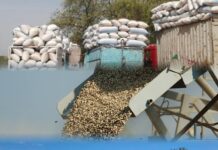Stakeholders in the fisheries sector have expressed concerns about the unavailability of surveillance vessels and the lack of well-equipped monitoring and communications centers.
They believe these will help safeguard the country’s territorial waters and combat poaching and illegal fishing.
They said the EU-Gambia fisheries agreement failed to provide surveillance vessels and all the necessary monitoring and communication centers.
This has created a vacuum that allows foreign fishing trawlers to freely harvest fish stocks in Gambia’s territorial waters.
The Gambian navy should have provided the needed patrols, but it currently lacks boats to effectively perform its duties.
“Right now, there is a lot of illegal fishing activity in our territorial waters by vessels; we have no idea where they are coming from. Daily we see vessels that engage in illegal fishing activities. Still, we don’t have the means to even get close to them because their activities are mainly concentrated on the high seas, which our boats cannot reach,” Omar Gaye, a fisherman at Tanji, lamented.
He added: “We believed that by now, the EU-Gambia fisheries agreement would have provided the surveillance vessels and put monitoring centers that would facilitate the protection of our territorial waters.
“The annual €550,000 sectoral support component of the project could have been enough to procure the necessary equipment and facilities that will be allowed us to have full control of our territorial waters.”
Dawda Saine, a local expert working with multiple groups in the sector, said the country is losing tonnes of fish stocks to poachers and illegal fishermen due largely to the inability to monitor its territorial waters.
The Gambia Navy, which has a mandate to secure and surveil the territorial waters, cannot effectively perform the job.
According to him, the navy’s patrol boats can barely patrol beyond five nautical miles out of the more than 200 nautical miles under its jurisdiction.
Thus, the lack of surveillance vessels and active monitoring and communication centers has made the country fertile ground for poachers and illegal fishing.
Under the EU-Gambia fisheries agreement, two surveillance vessels and two monitoring and communication centers for the country were to be provided.
However, only one monitoring and communication center was built, and the surveillance vessels were not delivered.
“I believe this EU-Gambia fisheries agreement could have addressed some of the challenges encountered by the local fishing industry and the navy regarding surveillance, monitoring, and communication.
“However, its failure to deliver as expected squarely lies on the government, which should have provided regular updates and reports to the EU on the project’s progress.
The Gambia government has not been doing this, which may be why specific project components are still pending,” Saine observed.
He continued: “I want to believe that the fishing agreement is not going in our favor because there are many developments it could have brought to the sector.
“The fishing agreement is almost in its fourth year, and we are left with little over two more years to go.
“However, the question is: When shall we put our house to be able to benefit from the project? This should have been the main focus of the Fisheries ministry and, by extension, government by now.”
On 31 July 2019, the European Union and the Gambian government signed a new six-year sustainable fisheries partnership agreement (SFPA) and the associated protocol.
This set out the fishing opportunities for EU vessels, the financial compensation to be paid by the European Union, and the modalities of sectorial support to Gambia’s fishing sector.
The current protocol to the fisheries partnership agreement covers the period 31 July 2019 – 30 July 2025 with a financial contribution of €550,000 per year over six years.
Out of this sum, a specific contribution of €275,000 was dedicated to supporting the fisheries policy of The Gambia.
This fisheries agreement allows EU vessels from Spain, Greece, and France to fish in Gambian waters. It is part of the tuna network fisheries agreements in West Africa.






